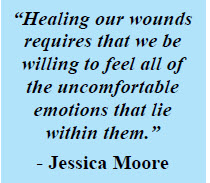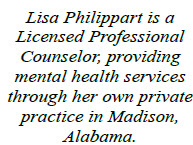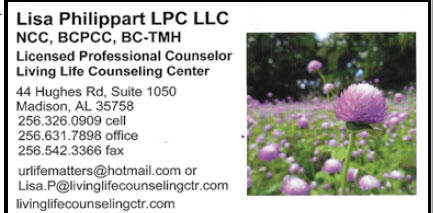 : Lisa Philippart
: Lisa Philippart
Many people think about painful emotions as viruses…destructive invaders that should be eliminated as soon as possible. Are you feeling anxious? Quick, what is a coping strategy that you can use to make it go away? The problem is that your emotions, even the really painful ones, are not invaders trying to hurt you. In fact, quite the opposite…your emotions are part of you and just trying to help. You feel anxious because your brain thinks something is dangerous and wants to keep you safe. Of course, your brain and the emotions it unleashes can be erroneous. There are times when our emotions are based on faulty information or reasoning. I remind my clients that just because an emotion feels bad doesn’t mean that it is bad or that they are bad. If you continue to treat emotions like the enemy, you may miss out on the times when these emotions are truly helpful and therefore something worth listening to. Let’s look at three emotions that, while uncomfortable, may be worth your attention.
 Envy is one of those emotions that, for whatever reason, people immediately think of as bad or dangerous. When you talk about envy, there is usually shame or guilt associated with it. But really desiring something that other people have is a pretty normal reaction. For example, if a co-worker gets a big promotion and raise, it’s natural that you would feel jealous and want one too. Like any emotion, envy itself is not a negative; it’s how you respond to it that matters. One problematic response to feeling envy is that you become obsessed with the object of your envy and then start ruminating on it. In addition to making you feel even more envious (and perhaps resentful), there are the emotional opportunity costs to consider…all the time and mental energy you’ve spent dwelling on what someone else has and you don’t. All that time and energy could have been more productively invested elsewhere.
Envy is one of those emotions that, for whatever reason, people immediately think of as bad or dangerous. When you talk about envy, there is usually shame or guilt associated with it. But really desiring something that other people have is a pretty normal reaction. For example, if a co-worker gets a big promotion and raise, it’s natural that you would feel jealous and want one too. Like any emotion, envy itself is not a negative; it’s how you respond to it that matters. One problematic response to feeling envy is that you become obsessed with the object of your envy and then start ruminating on it. In addition to making you feel even more envious (and perhaps resentful), there are the emotional opportunity costs to consider…all the time and mental energy you’ve spent dwelling on what someone else has and you don’t. All that time and energy could have been more productively invested elsewhere.
 The more problematic response to envy has to do with values. Specifically, if the feeling of envy leads you to confuse other people’s values and goals with your own, you’re in for trouble. If you invest significant financial resources into lavish vacations or expensive homes simply because that’s what the people you envy are doing, well, it’s not hard to see how that gets problematic. When you make your decisions based on other people’s values, you end up living someone else’s life! Rather than immediately avoiding the feeling of envy, and keeping yourself in denial about it, what if you used it as a cue to self-reflect about what you really want? Here’s an example: You notice yourself feeling jealous of a friend’s amazing Instagram vacation photos. Maybe that envy is trying to tell you something. Not that you need to take that exact same trip necessarily, but perhaps that you’re craving more adventure or variety in your life. Or maybe that you value spending quality time with your family doing fun things but haven’t really been doing it much lately. Rather than immediately avoiding envy, judging yourself for it, or acting on it impulsively, try to get curious about it. Very often, envy is a useful cue for thinking more deeply about your values and the things that matter most.
The more problematic response to envy has to do with values. Specifically, if the feeling of envy leads you to confuse other people’s values and goals with your own, you’re in for trouble. If you invest significant financial resources into lavish vacations or expensive homes simply because that’s what the people you envy are doing, well, it’s not hard to see how that gets problematic. When you make your decisions based on other people’s values, you end up living someone else’s life! Rather than immediately avoiding the feeling of envy, and keeping yourself in denial about it, what if you used it as a cue to self-reflect about what you really want? Here’s an example: You notice yourself feeling jealous of a friend’s amazing Instagram vacation photos. Maybe that envy is trying to tell you something. Not that you need to take that exact same trip necessarily, but perhaps that you’re craving more adventure or variety in your life. Or maybe that you value spending quality time with your family doing fun things but haven’t really been doing it much lately. Rather than immediately avoiding envy, judging yourself for it, or acting on it impulsively, try to get curious about it. Very often, envy is a useful cue for thinking more deeply about your values and the things that matter most.
In my next article, we will cover the troublesome emotions of pride and pity.
By: Lisa Philippart
Licensed Professional Counselor









 June 20, 2025
June 20, 2025



